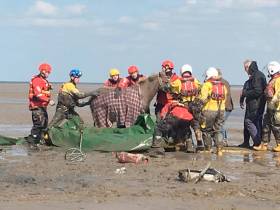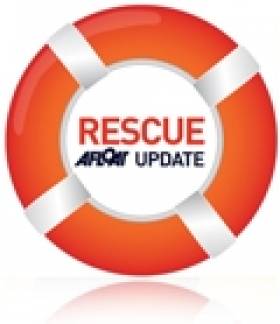Displaying items by tag: Somerset
Horse riders and owners have been warned over taking their animals to beaches or mudflats after two separate rescue incidents in the UK in recent days
Last Saturday (13 April) two horses and their riders were rescued from thick mud after they became stuck while riding on the Wirral coast near Liverpool.
Hoylake RNLI’s hovercraft joined Flint and Wirral Coastguard Rescue among the emergency services at the scene on Saturday morning, which saw one of the horses stuck up to its belly in very thick mud.
Emergency services tried digging around the horse to free its legs to no avail. The RNLI crew and coastguard also used their mud lances in an attempt to soften the sand with water and compressed air, but the mud proved too thick for this equipment.
After some further digging, and with gentle encouragement from the emergency services, the horse managed to free itself but became stuck again.
Finally, mud boards and mats were deployed to provide the horse with some firmer footing.
The horse was freed again and managed to climb onto the boards with some assistance. A vet on the scene then administered a sedative to avoid any further distress to the animal and to help the emergency services to move it to shore safely.
“Considering the ordeal the horse had been through, its behaviour was exceptional in what was clearly a distressing situation,” said Hoylake RNLI crew member Ian Farrall. “The emergency service teams worked really well together, pooling their resources and experience to ensure a good outcome in very difficult circumstances.”
The following day, HM Coastguard received 999 calls reporting a horse and rider in distress and stuck in the mud at Burnham-on-Sea beach in Somerset.
Fortunately the rider was not injured but the coastguard launched a multi-agency response to recover the horse and keep the rider safe before the rising tide covered the area.
Gemma Griffiths, the senior maritime operations officer who was co-ordinating the incident in Somerset, offered safety advice for walkers and riders as the longer days come in.
“Take care when walking or riding over these big expanses of tidal sand or mud and consider getting guidance from someone with local knowledge if you are at all unsure about your route.”
Lost Irish Fishermen Found Safe and Sound Off Minehead
FOUR Irish fishermen reported missing on Sunday have been found in good spirits off the coast of Minehead in Somerset.
This Is The West Country reports that the four men had left Helvick harbour in Co Waterford early on Sunday on a fishing trip but got lost shortly thereafter.
After contacting the coastguard with their concerns, the Helvick Head RNLI lifeboat was dispatched to Minehead, where the lost boat had been found by another fishing vessel, Faoilean Ban.
The lost fishermen subseqently followed the Faoilean Ban back to port at Helvick.































































